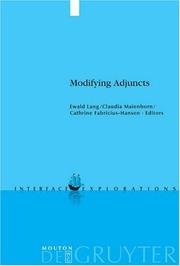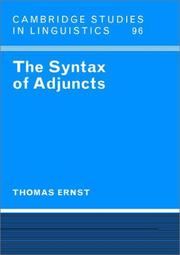| Listing 1 - 4 of 4 |
Sort by
|

ISBN: 3110173522 3111796817 3110894645 9783110894646 9783110173529 9783110173529 Year: 2003 Volume: 4 Publisher: Berlin Mouton de Gruyter
Abstract | Keywords | Export | Availability | Bookmark
 Loading...
Loading...Choose an application
- Reference Manager
- EndNote
- RefWorks (Direct export to RefWorks)
Unlike the notion of "argument" that is central to modern linguistic theorizing, the phenomena that are commonly subsumed under the complementary notion "adjunct" so far have not attracted the attention they deserve. In this volume, leading experts in the field present current approaches to the grammar and pragmatics of adjuncts. The contributions scrutinize i.a. the argument-adjunct distinction, specify conditions of adjunct placement, discuss compositionality issues, and propose new analyses of event-related modification. They are meant to shed new light on an area of linguistic structure that is deemed to be notoriously overlooked.
Grammar, Comparative and general --- Adjuncts. --- Syntax. --- Grammar --- Adjoints (Linguistique) --- Syntaxe --- Adjunctivals (Grammar) --- Adjuncts (Grammar) --- Adjunctivals --- Language and languages --- Syntax --- Linguistics --- Philology --- Grammar, Comparative and general Syntax
Book
ISBN: 9789027255532 9789027287328 9027287325 1283174960 9781283174961 9027255539 9786613174963 6613174963 Year: 2011 Publisher: Amsterdam Philadelphia, PA John Benjamins
Abstract | Keywords | Export | Availability | Bookmark
 Loading...
Loading...Choose an application
- Reference Manager
- EndNote
- RefWorks (Direct export to RefWorks)
This book explores the syntactic and semantic properties of movement and adjunction in natural language. A precise formulation of minimalist syntax is proposed, guided by an independently motivated hypothesis about the composition of neo-Davidsonian logical forms, in which there is no atomic movement operation and no atomic adjunction operation. The terms 'movement' and 'adjunction' serve only as convenient labels for certain combinations of other, primitive operations, and as a result the system derives non-trivial predictions about how movement and adjunction should interact; in particular,
Grammar, Comparative and general --- Semantics. --- Adjuncts. --- Conjunctions. --- Syntax. --- Adjunctivals (Grammar) --- Adjuncts (Grammar) --- Conjunctions (Linguistics) --- Language and languages --- Syntax --- Formal semantics --- Semasiology --- Semiology (Semantics) --- Comparative linguistics --- Information theory --- Lexicology --- Meaning (Psychology) --- Adjunctivals --- Connectives --- Linguistics --- Philology --- Grammar, Comparative and general Syntax
Book

ISBN: 1283857154 311028586X 9783110285864 9781283857154 9783110285802 3110285800 Year: 2012 Publisher: Berlin Boston
Abstract | Keywords | Export | Availability | Bookmark
 Loading...
Loading...Choose an application
- Reference Manager
- EndNote
- RefWorks (Direct export to RefWorks)
This book investigates specific syntactic means of event elaborationacross seven Indo-European languages (English, German, Norwegian,French, Russian, Latin and Ancient Greek): bare and comitative smallclauses ("absolutes"), participle constructions and related clause-like butnon-finite adjuncts that increase descriptive granularity with respect toconstitutive parts of the matrix event (elaboration in the narrowestsense), or describe eventualities that are co-located and connectedwith but not part of the matrix event. The book falls in twoparts. Part I addresses central theoretical issues: How is the co-eventiveinterpretation of such adjuncts achieved? What is the internal syntax ofparticipial and converb constructions? How do these constructionsfunction at the discourse level, as compared to various finite structuresthat are available for co-eventive elaboration? Part II takes an empiricalcross-linguistic perspective. It consists of five self-contained chapters thatare based on parallel corpora and study either the use of a specificconstruction across at least two of the seven object languages, or how aspecific construction is rendered in other languages.
Grammar, Comparative and general --- Semantics. --- Formal semantics --- Semasiology --- Semiology (Semantics) --- Comparative linguistics --- Information theory --- Language and languages --- Lexicology --- Meaning (Psychology) --- Voice (Grammar) --- Syntax --- Adjunctivals (Grammar) --- Adjuncts (Grammar) --- Adjuncts. --- Syntax. --- Voice. --- Adjunctivals --- Linguistics --- Philology --- Grammar, Comparative and general Syntax --- Corpus (Linguistics). --- Discourse Analysis. --- Pragmatics (Language).

ISBN: 052177134X 0521028183 1107119243 9786610429431 0511175922 0511325487 0511486251 1280429437 0511156618 0511049501 0511019297 9780511019296 9780511156618 9780521771344 9780511486258 9780511049507 661042943X 9780521028189 Year: 2002 Publisher: Cambridge : Cambridge University Press,
Abstract | Keywords | Export | Availability | Bookmark
 Loading...
Loading...Choose an application
- Reference Manager
- EndNote
- RefWorks (Direct export to RefWorks)
This book proposes a theory of the distribution of adverbial adjuncts in a Principles and Parameters framework, claiming that there are few syntactic principles specific to adverbials; rather, for the most part, adverbials adjoin freely to any projection. Adjuncts' possible hierarchical positions are determined by whether they can receive a proper interpretation, according to their selectional (including scope) requirements and general compositional rules, while linear order is determined by hierarchical position along with a system of directionality principles and morphological weight, both of which apply generally to adjuncts and all other syntactic elements. A wide range of adverbial types is analysed; predicational adverbs (such as manner, and modal adverbs), domain expressions like financially, temporal, frequency, duration and focusing adverbials; participant PPs (e.g. locatives and benefactives); resultative and conditional clauses, and others, taken primarily from English, Chinese, French and Italian, with occasional reference to others (such as German and Japanese).
Grammar, Comparative and general --- Adjuncts. --- Adverbials. --- Syntax. --- 801.56 --- -Grammar, Comparative and general --- -Semantics --- Formal semantics --- Semasiology --- Semiology (Semantics) --- Comparative linguistics --- Information theory --- Language and languages --- Lexicology --- Meaning (Psychology) --- 801.56 Syntaxis. Semantiek --- Syntaxis. Semantiek --- Comparative grammar --- Grammar --- Grammar, Philosophical --- Grammar, Universal --- Philosophical grammar --- Linguistics --- Philology --- Adjuncts --- Adverbials --- Syntax --- Grammar, Comparative --- Semantics --- Adjunctivals (Grammar) --- Adjuncts (Grammar) --- Adjunctivals --- Arts and Humanities --- Language & Linguistics --- Semantics. --- Grammar, Comparative and general Syntax
| Listing 1 - 4 of 4 |
Sort by
|

 Search
Search Feedback
Feedback About UniCat
About UniCat  Help
Help News
News